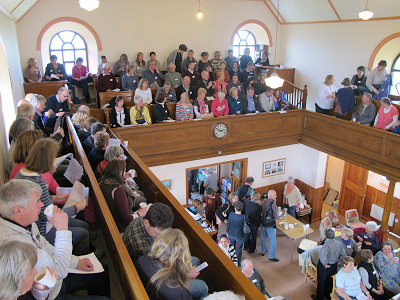I've been spending more time at Caffè Nero during the last few weeks. It's been good to get to know some of the guys there, there's a real social buzz about the place.
Today there was some conversation about the need to help people in difficulty, we considered that traditional church has considerable resources that could be mobilised to help.
I was reminded of a story my old work colleague, Phil, used to tell.
Phil and his intrepid travelling companion Tony have covered a lot of ground together. They spent weeks and weeks in India one year, travelling light, depending on local hospitality, shunning the tourist scene and hotels, getting to know the people and experiencing India as it really is.
Trip to Mexico - They did a similar trip to Mexico, and it was here that the story was based. One day they were in a square in Mexico City (I think). There was a cathedral in the square and they went inside to take a look. It was full of gold, expensive vessels, gilded statues, rich needlework and carved stone and wood.
As they left the building they noticed a beggar who was not allowed inside. The cathedral was for rich people only, particularly tourists. The beggar was hungry, dressed in filthy rags, crippled, and needing help. The contrast between the beggar and the riches inside the cathedral was extreme.
Phil and Tony walked away angry that such a situation existed and in deep sorrow. I can't even begin to describe the way they must have felt about church. Would you rather be the beggar or the bishop who manages the cathedral?
Dealing with injustice - The world is full of injustice. We discussed some aspects of this at Nero's, but we can't change other people and we can't change the church, or the government, or the wealthy. We might have some influence with our vote, we can express an opinion, we can write to our MP, but those may make little difference and they certainly won't meet today's need - even if they might improve things a little in the long run. (But don't hold your breath.)
It seems to me that each one of us is responsible for loving the people we see around us. Jesus didn't lobby the Sanhedrin or the Roman governor to do more - he just healed the sick, cast out demons, touched lepers, fed the hungry, and made extra wine for a wedding.
I don't think the way forward is to criticise the government, the church, or the wealthy. I must do whatever I can to help anyone in need (whether that's for food, for a roof, or just for a friendly smile and a kind word). If we all did our bit, nobody would go short. Everyone can do something. It's not about resources, it's mostly about noticing and willingness to get involved. So the question is, what am I going to do about it and what are you going to do about it?
We will all have to give an account of the way we have lived. When that time comes would you rather be the beggar or the bishop who manages the cathedral?
Questions:
- How many ways can you think of helping someone in need - assuming you have no resources? (There are plenty of ways, here are a few to get you started. Talk to people, listen, smile.)
- How much influence do you have over organisations? Most of us have very little.
- Is complaining ever a useful thing to do? If so, explain why and how.
- What are the main barriers to helping people you don't know?
See also:
- Baptist in Kolkata - Journeys of heart and mind
- Caffè Nero (W)
- Light on the path - Journeys of heart and mind
- Mexico - Wikipedia
- Mexico City - Wikipedia
- Mexico City Metropolitan Cathedral (W)
- Sheep, goats and judgement - Journeys of heart and mind







